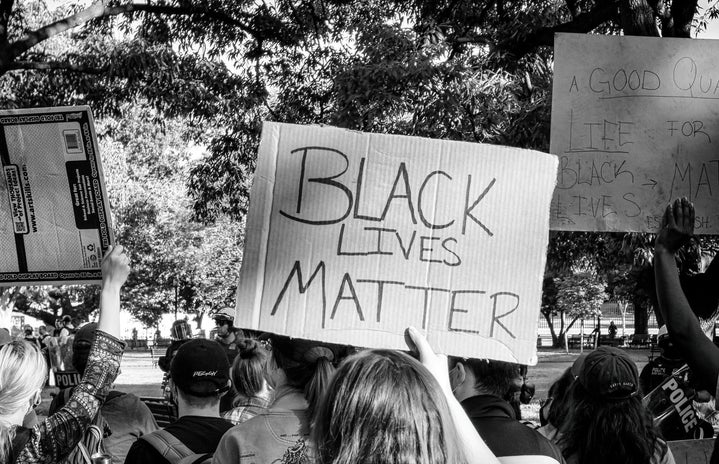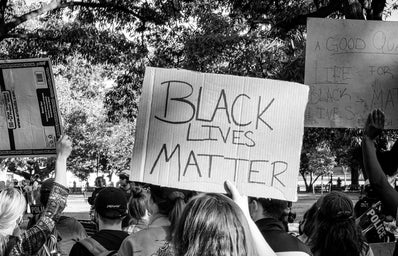Disclaimer: The opinions stated in this article are those of the author and do not reflect the views of Her Campus.
I was 13 when Trayvon Martin was murdered. I remember seeing reports about the shooting on the news. I remember discussing what happened with my parents. I had learned about segregation and the Civil Rights movement from history classes in school. I had learned that racism continued long after desegregation from my mom who told me about horrendous signs posted in my dad’s hometown when they first started dating. That was the 90s. Up until that moment in 2012 when Trayvon Martin’s murder was broadcasted across the country for the hate crime that it was, I had lived in a fantasy world where racism was a thing of the past and that’s because I’m white. I never had to experience it myself. I always went to schools attended mostly by other white kids, and in these schools, they don’t teach us that many of those people who opposed desegregation passed those beliefs on to their children, who then passed them on to their children. Instead, we’re taught that Martin Luther King Jr. led peaceful protests until the white folks in power decided they deserved some rights. Then racism dissolved into thin air and America became the great country we know and love today. But that’s not history.

Black Lives Matter (BLM) was founded in 2013 in response to the acquittal of Trayvon Martin’s murderer, George Zimmerman, and was immediately met with opposition. Mockery movements such as All Lives Matter and Blue Lives Matter emerged. To be completely honest, when I first heard of the Black Lives Matter movement, my first response was also to think that all lives matter. But as I learned more about what BLM stood for, I began to understand the distinction. Seven years after their founding, Black Lives Matter is still being met with opposition, especially in response to recent protests sparked by the murders of George Floyd and Breonna Taylor. Throughout these protests, I have been very active on social media and have been increasingly frustrated by the number of people still contending with the need for the distinction between Black Lives Matter and All Lives Matter, so in writing this article I aim to educate my white peers on the importance of this movement, the recent protests and the structural racism that still runs rampant in America.

First and foremost, Black Lives Matter is not an assertion that non-Black lives are of any less importance. As stated on their website, BLM is an organization “whose mission is to eradicate white supremacy and build local power to intervene in violence inflicted on Black communities by the state and vigilantes.” In a collection of data from 2019, Black Americans were found nearly three times more likely than white Americans to be killed by police. This is why Black Lives Matter exists. Because Black lives are in danger. Over the past few days, I’ve seen multiple analogies breaking down the meaning behind BLM and I think the best one I’ve heard is this: consider you’re at a dinner table with four other people. Each of the others receives a plate full of food, but yours is left empty. As the others begin to eat you say, “I’m hungry.” Shoveling a mouthful of mashed potatoes into her face, Karen responds with her mouth full, “We’re all hungry. Get over it.” Hungry for the safety we experience as white people in America, Black Americans have sought our help, yet are constantly met with the complaint that everyone wants to feel safe. They aren’t special in their requests. Yes, everyone does want to feel safe. But not everyone’s safety is at risk. Not everyone can feel safe until Black people feel safe. All lives cannot matter until Black lives matter.
Those still perpetuating the notion that Blue Lives Matter continue to miss the point. There is no such thing as “blue lives.” Being a cop is a choice; being Black is not. Men and women that decide to become police officers do so with the knowledge that they are putting their lives at risk for their profession. Becoming a “blue life” is a conscious decision. Black people are at risk simply for existing. Cops are at risk because they chose to be cops. Not only that but as police officers, they are sworn to protect the very lives they are taking. Yet people still come to their defense. “But cops kill white people all the time.” Yes, they do. So why aren’t you enraged? Where is your thirst for justice and accountability for these cops who spoil the entire justice system? “It’s just a few bad apples.” Why are you so quick to defend a system that is corrupt enough to allow this many bad apples? Where is the accountability for the so-called good cops who know their coworkers are racist or violent, but stay silent? If you can acknowledge that there are all these “bad apples” within our police force, then acknowledge the fact that the system has allowed it to be this way. They are not held accountable for their actions, and that has to change.
Derek Chauvin, the officer who kneeled on George Floyd’s throat for nine minutes over a complaint about a false $20 bill, had at least seventeen prior complaints filed against him with the Minneapolis Police Department’s Internal Affairs. SEVENTEEN complaints, one of which was filed by a young man who alleged Chauvin and another officer pulled a gun on a group of teenagers playing with Nerf guns. Sixteen of these complaints against Chauvin were closed without discipline. The police department has refused to release the details of the complaints made against him. But Chauvin, like so many other officers, was allowed to continue his job and now another innocent Black man is dead. Why are these “bad apples” given so many chances? Bad apples in the medical field can lose their license after one malpractice lawsuit. You wouldn’t want to be treated by a doctor who doesn’t do their job properly, so why would you want to be protected by a police officer who doesn’t do theirs?

Among those questioning the distinction of the importance of Black lives are those condemning the violent nature of recent protests. I have personally never been one to advocate for violence, but history dictates that the power does not lie with the peaceful. If you are gay, you have Marsha P. Johnson, who is thought to have thrown the brick that started the Stonewall Riots in Greenwich Village, to thank for your rights. If you are a woman, you can thank the suffragettes and their tendencies toward “window-smashing and rock-throwing” for your voting rights. You can thank women like Kitty Marion, who dedicated her entire life to fighting for women’s access to contraception. If you are American, you can thank Revolutionary War-era protestors like Samuel Adams, who led multiple violent protests against the British, including the infamous Boston Tea Party. If you want to condemn the looters of today’s protest, then you must also condemn the patriots who dumped tea into the Boston Harbor. And if we are questioning the validity of violent protests for the civil rights cause specifically, consider this: the assassination of Martin Luther King, Jr. in 1968 sparked riots across the country. The Fair Housing Act, an expansion of the Civil Rights Act of 1964, was passed a week later.
But they don’t teach you that one in US history, do they? You get the whitewashed, abridged version where MLK tells everyone to be peaceful, and then racism ends. But MLK himself, while advocating for peace, understood that violence has a place in the fight for equality. In 1966, King responded to questions by CBS reporter Mike Wallace about protestors who seemed to disagree with his advocacy for non-violence: “I think that we’ve got to see that a riot is the language of the unheard. And, what is it that America has failed to hear? It has failed to hear that the economic plight of the Negro poor has worsened over the last few years.” People who support Black Lives Matter have been protesting peacefully for years. America has failed to listen and that has consequences.

However, while we’re on the topic of today’s violent protests, let’s discuss the causes of the violence. Throughout the last few days, I have seen numerous videos on Twitter of police officers attacking peaceful protestors, planting bricks at the scene of protests and destroying medic tents set up for protestors injured by teargas or rubber bullets, as well as undercover cops inciting violence and committing arson. If you don’t believe me, here is an ongoing thread of video evidence of police inciting violence at protests. Where was this same energy when white folks were armed to the teeth protesting business closures due to the COVID-19 pandemic? These protestors are unarmed, protesting police brutality, and the police force’s response is more police brutality. I implore you to consider the irony of this.

As white people, as well as non-Black people of color, it is not our responsibility to tell Black people how they should feel about the violence and hatred perpetrated against the Black community. What is our responsibility, is educating ourselves on our own implicit biases and the ways racism is embedded in our society. In my experience, my Black friends have been happy to explain things to me. But I know they are tired of being responsible for educating white folks on the implications of hundreds of years of systemic racism and hatred against Black men and women in the same way that I am tired of explaining to men what it’s like to be in constant fear of sexual violence. I hesitate to make comparisons like this because these situations are so different, but I think comparisons can often be a helpful stepping-stone on the way to understanding. Racism is something history has forced upon the Black community, and therefore it is not their responsibility to break it down for us. I consider myself a very empathetic person, but the reality is that I have never and will never experience the fear of senseless violence that any of my Black friends experience daily. As a white person, I am aware of the privilege I have to walk the streets without alarm. I aim to use this privilege to fight for those who can’t, and I hope anyone reading this will do the same.
Don’t be upset that you don’t have a movement about you. Be grateful you don’t need a movement. Instead of feigning disdain over matters of false oppression, like the COVID-19 closures put in place to protect us from a deadly virus, join a movement that already exists. Just because it’s not about you does not mean you can’t or shouldn’t care.
Want to see more HCFSU? Be sure to like us on Facebook and follow us on Instagram, Twitter and Pinterest



